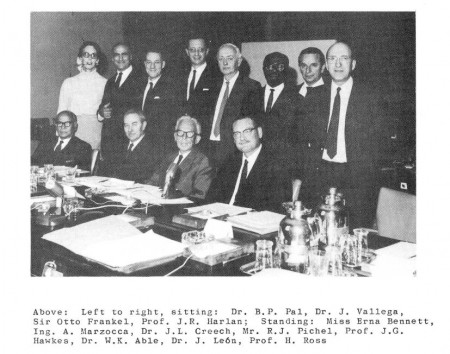- Big grant for TC Dublin to create DNA matrix of ancient livestock, will identify parchments too.
- Kew unites Augustine Henry’s letters with the objects and specimens he collected; agrobiodiversity included.
Another photograph of Erna Bennett surfaces
Thanks to Helmut Knüpffer for sending in a scan of the Plant Introduction Newsletter No. 22 (July 1969), featuring a short report about the “FAO Panel of Experts on Plant Exploration and Introduction”. This includes a photograph of the eminent participants, one of whom is Erna Bennett (top left), who died a few weeks back.
Nibbles: Educashun, Landscapes, Botany, AnGR, Tourism, Ham museum, Native American seeds, Ancient Egyptian grain storage, Ancient beer
- Want to teach about agrobiodiversity? Help is at hand.
- Want to learn about agrobiodiversity? Stay here.
- Want to know what’s going on in biodiversity conservation at Cambridge? Here’s how. Tell us if agriculture gets a look-in. If it doesn’t, come back here. But I bet there’ll be something about landscapes.
- What is a landscape? “The answer … differs tremendously depending on the respondent,” it says here. Wow, those Cambridge boffins will be so shocked.
- Want to know about the plants in that landscape whose definition is so much in the hands of respondents? Most were discovered by just a few botanical superstars. But how many women?
- And if that landscape is Turkish and there are (is?) livestock in it, this is what you’ll see.
- Want to tour the world’s top evolution sites? Here’s the first stop. Now, how about crop evolution (and domestication, natch) sites. Like some livestock- and crop-wild-relative-discovered-by-a-botanical-superstar-filled Turkish landscape, perhaps.
- Or what about sites connected with food production and marketing more generally, for that matter. No, that list would be too long. Interesting, but too long. Would need to prioritize ruthlessly.
- One thing for certain, though, it should include a couple of community genebanks.
- Where it is not inconceivable that seeds would be protected following age-old practices. Which may or may not be taught in fancy courses.
- Oh, and beer.
Nibbles: Chillies, Catfish, Blight, Beef, Svalbard, Biofortification, Agriculture and health book, Ahipa, GBIF, Pacific grape and nuts, Cassava and marriage, Amazon, Lost genebanks, Vietnamese food, Yoghurt
- Another use for chillies: keeping errant apes away.
- Catfish are the new tilapia.
- New fungicide-resistant strain of potato late blight found in UK. (How do they name these things?)
- The chickenization of the US beef industry, on NPR. Salutary.
- The Seed Warrior of Svalbard gets over-exposed.
- What HarvestPlus is doing on each of its crops, in a handy brochure. And more on the same subject but a different crop from Bill Gates himself.
- But that’s just one aspect of the relationship between agriculture and nutrition/health. Right? Right.
- You also need dietary diversification, right? Right.
- What’s that you say? Biodiversity databasing need not be hellish?
- Danny waxes nostalgic about Wallis and Futuna grapes. He and I also met a few nuts in the Pacific in our time. Grape-nuts. Geddit?
- Latest Plant Cuttings includes big piece on cassava.
- And you can put that in an ecological context.
- Do you have a forgotten germplasm collection?
- Vietnam gets its first EU Geographic Indication. Can’t help thinking it need not have bothered.
- Greek yoghurt, on the other hand…
Nibbles: Landscapes, Ireland, Veitch’s, Purple tomato
- Revitalising socio-ecological production landscapes. It’s all the buzz, even though it doesn’t trip off my tongue.
- And the buzz keeps building for AgBioDiv 2012 in Ireland, 9 February.
- The great house of Veitch — but not a word about their many veg varieties.
- The first “really” purple tomato now available as seed.
